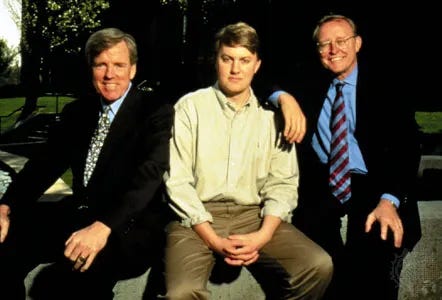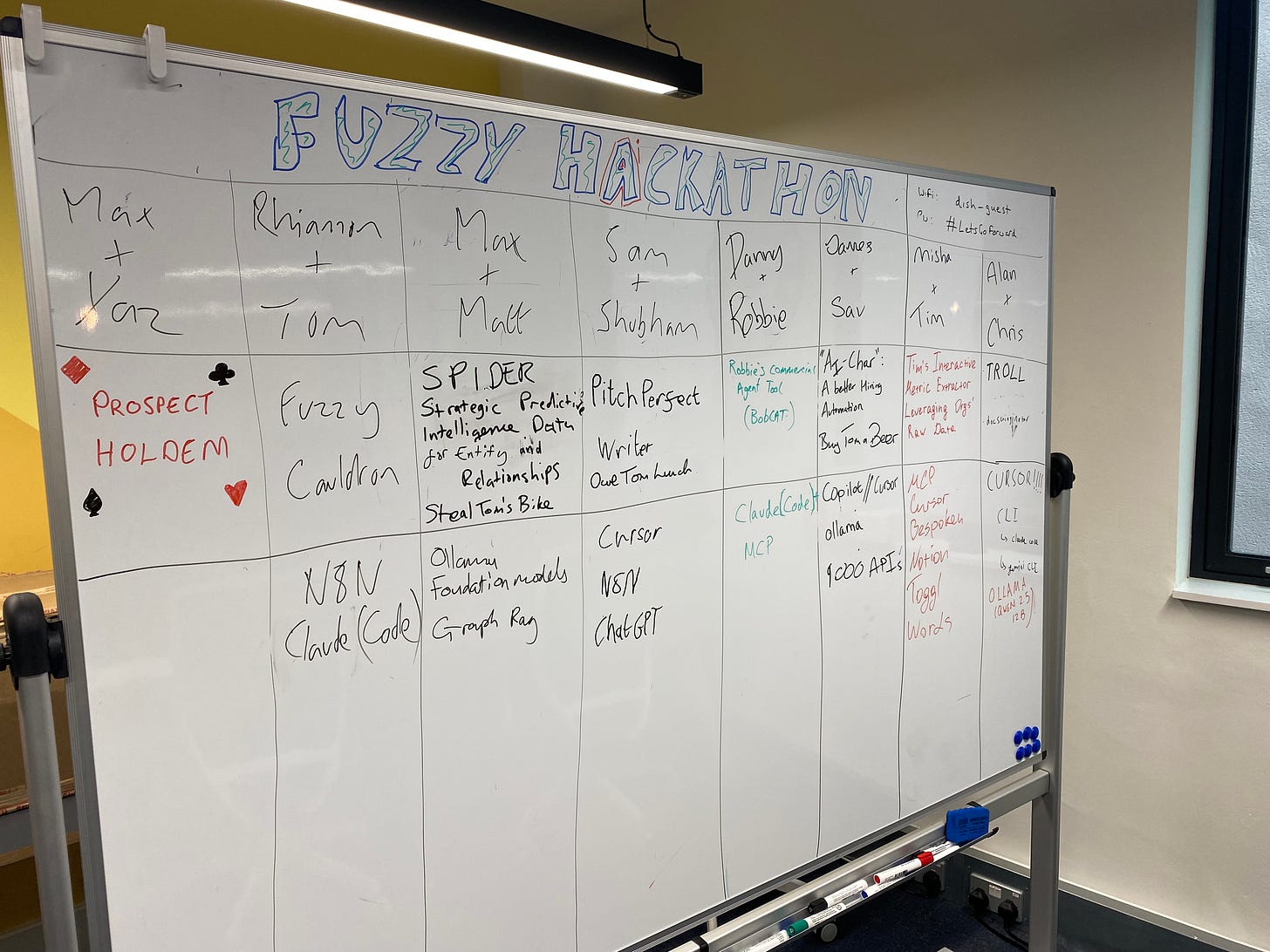AI Is Eating the World
Can you imagine getting anything done today without software? MLOps.WTF Edition #12
Ahoy there 🚢,
It’s been 14 years since venture capitalist Marc Andreessen published his now-famous essay Why Software Is Eating the World. His argument was that software companies would disrupt every traditional industry, with the Internet as the great enabler for delivering products at scale.
Back then, Amazon was already the world’s biggest bookshop and Netflix the world’s biggest film rental service. But Marc’s point was that software wouldn’t stop there... it would seep into every aspect of our work and lives.
Reading that essay now, it all feels completely obvious. Of course software is everywhere. Of course it runs our businesses. Of course we couldn’t function without it.
Try imagining your working day without it. No project tracking. No shared docs. No Slack. Want to organise a meeting? Get everyone in a room at the same time and write it in your paper diary. Need to update the product roadmap? Better get your massive overhead projector warmed up (remember those?).
For a typical business, software touches everything, from marketing and product design, to sales and HR. And it’s commoditised to such an extent that for anything you might need, you can simply subscribe to it, without having to run or maintain anything yourself.
But the odd thing is that even in this “everything is software” era, we still end up doing a surprising amount of work manually. Silly things that feel like they should be easy to automate. Take writing PR summaries. You've just implemented a feature (the code changes are right there) but you still need to write up what changed and what the reviewer should look at. The information exists, but it's not connected to where it needs to be.
Can’t things just talk to each other?
This is the reality for most organisations: a constellation of applications, each brilliant at its own job, yet completely unaware of each other. At Fuzzy Labs, one frustration is comparing a project’s estimated duration to its actual delivery time. The estimates live in a proposal document, and we’ve also got a scheduling system that duplicates that information. And by looking in Jira, we can see how long each ticket actually took to complete. All the pieces exist, but they don’t connect.
And sure, we have APIs. The drive to put APIs in everything started around 2010, although REST dates back to 2000 and SOAP 1998 (cue jokes about engineers taking too long to discover soap…).
But to join things up, you need to read docs, write code, debug weird edge cases, and then deploy and maintain the integration.
The alternative? You go into the user interface and look at things manually, and nobody wants that.
(Marc Andreessen (centre) with fellow Netscape officers Jim Barksdale (left) and James Clark (right), 1995.)
Enter the AI Layer
Agentic AI offers something genuinely new. In the space of just 3 years we’ve gone from the first release of ChatGPT, to LLMs powerful enough to use tools, and actually be good at it!
That means we can finally outsource much of this integration drudgery to AI, provided we tell it how to talk to the software systems we use.
Think of it this way: Agentic AI is a universal adapter layer sitting on top of all existing software that we have today. In many cases, it could even replace parts of that software entirely.
It’s the same pattern Andreessen identified, but accelerated. What took software decades to achieve—transforming entire industries—AI is accomplishing in the software layer itself within just a few years.
We’ve moved from software is eating the world to AI is eating the software. And yet, the shift snuck up on us in exactly the same way. Even as an AI consultancy ourselves, we at Fuzzy Labs weren’t making the most of AI in our own operations. That felt wrong… if we help clients build, engineer, and productionise AI, we should be leading by example.
Our Day of Reckoning
Inspired by Zapier, we ran an internal hackathon aimed at helping us use AI more effectively across our business. Eight teams, one day, with a simple brief: automate something that’s slowing you down.
Some honourable mentions:
Prospect Hold'em automated the tedious dance between our outreach tool (Apollo) and CRM (Capsule). previously a purely manual data entry job.
Fuzzy Cauldron pulled together all our scattered community metrics
(CRM data, LinkedIn connections, event attendees, newsletter subscribers etc) into a single dashboard.
SPIDER used AI to extract entities into graphs and visualise their relationships. We used it to accelerate research tasks, doing things that would take hours by hand.
BobCAT tested whether our AI stack could answer meaningful operational questions ("What was our capacity in February?") with enough detail to act on.
Every project created something genuinely useful. Some were ready to deploy immediately; others sparked bigger changes to how we want to work.
[Read the full story of our hackathon here]
What I personally learnt from the process
The most significant realisation? Programmers are no longer the only people producing software, it's been democratised. Our non-technical team members were building functional automations that would have required dedicated development time just months ago.
But this comes with important caveats:
It's still crucial to be clear and unambiguous about requirements. This has been a consistent problem throughout software history, and AI doesn't magically solve it. If anything, the ease of building things makes precision more important, not less. Vague requirements still produce vague results, just faster.
There's more need than ever for proper engineering practices, particularly MLOps. When everyone can build AI-powered tools, you end up with more applications being created than ever before. Without proper monitoring, versioning, and governance, you're just automating your mistakes at scale. The temptation to click "accept" on AI-generated code without understanding it is real, and dangerous.
Secondly, all this AI exists to solve human problems. The technology is the means, not the end. The most successful projects in our hackathon weren't the most technically impressive, they were the ones that eliminated genuine friction from how people actually work.
The takeaway is simple: AI isn't just another tool in the shed. It's a new way of wiring your business together, one that can eliminate the invisible "glue work" that slows down revenue, service, and innovation. But the glue can't be made of guesswork. If you don't design it with care, you'll just be automating your mistakes at scale.
If Marc Andreessen was right that software would eat the world, the next chapter is here. AI is eating software, and the organisations that win will be the ones that see AI not as magic, but as a capable partner in building, connecting, and amplifying their work.
And Finally…
Since the hackathon, we've started consolidating our tools to become more efficient: Sam's leading the charge on this, particularly around getting the most out of Cursor, especially using the new GPT-5 model. But we're still very much in the "play and experiment" phase, figuring out how and where these tools actually make sense. Another internal hackathon is definitely on the horizon.
Speaking of hackathons, the team's been curious about collaborating on one with another company. If you think your team would be up for a joint experiment in AI-powered automation, we'd love to hear from you!
Upcoming Events & Community Updates
I'm giving a talk called "Are we the last programmers? AI and the future of code" at Manchester Tech Festival this September. I'll be exploring whether we're the last generation to hand-craft code, with live demos and practical insights into adapting to AI coding tools. Come and see what the fuss is about.
Our next MLOps.WTF meetup is on 9th September at the GM Digital Security Hub in Manchester. We're diving back into Agentic AI—one of the most talked-about topics right now—with fresh research on how the space is evolving. Food, drinks, and proper conversations about the latest in MLOps guaranteed.
About Fuzzy Labs
We're Fuzzy Labs. A Manchester-rooted open-source MLOps consultancy, founded in 2019.
Helping organisations build and productionise AI systems they genuinely own: maximising flexibility, security, and licence-free control. We work as an extension of your team, bringing deep expertise in open-source tooling to co-design pipelines, automate model operations, and build bespoke solutions when off-the-shelf won't cut it.
Newsletter evolution: Here's the thing… Matt's been writing these newsletters solo, and frankly, he's rubbish at keeping them consistent. So we're doing what we do best: bringing in the whole team. You'll now hear from different Fuzzcians - engineers, strategists, and voices from our wider community. Think of it as our not-so-secret source for better insights: more perspectives, more experiments, more honest stories about what actually works (and what spectacularly doesn't).
Currently: We're looking for a Senior MLOps Engineer and a Lead MLOps Engineer to join our Manchester team. You don't need existing MLOps experience - just solid engineering skills, a passion for open source, and the curiosity to dive into this rapidly evolving field. If you get excited about the newest LLMs or figuring out how to scale generative models in the cloud, you'll fit right in.
Current opportunities:
Senior MLOps Engineer - Fuzzy Labs
Lead MLOps Engineer - Fuzzy Labs
Want to chat? We're always up for a proper conversation about tricky ML problems - no sales pitch, just engineers talking shop.
Liked this? Forward it to someone who's wrestling with getting their ML models into production and keeping them there. Or give us a follow on LinkedIn for more saucy insights.
Not subscribed yet? Why not? Get these insights delivered when we actually manage to write them.



